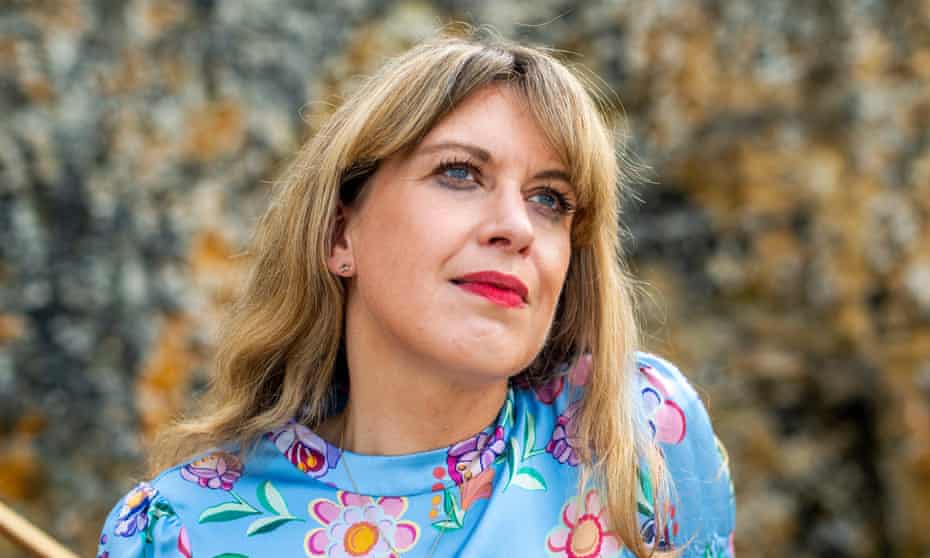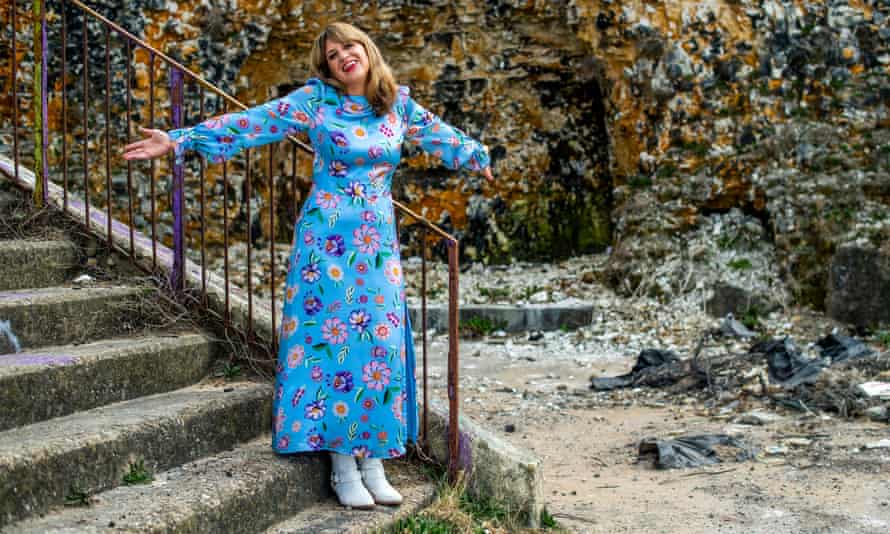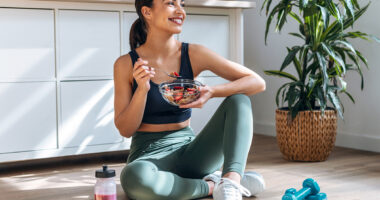What I wish I’d known about living with an anxiety disorder

When Daisy Buchanan was diagnosed with anxiety in her 20s she finally had a name for what she was feeling, but not the tools to cope. Here’s how she has learned to live with it
To some extent, anxiety is an entirely logical response to being alive, and being a human among other humans.
When I was diagnosed with generalised anxiety disorder in my 20s, this thought would have been helpful. To know that the way I responded to some ideas and possibilities was extreme, but it wasn’t unusual or illogical. However, that was not how I saw things. I decided that I was a dog, my anxiety was fireworks, and every night was Bonfire Night.
“Sorry, I can’t, I have anxiety,” was a brilliant excuse. At the time, I meant it. My anxiety felt overwhelming and debilitating. The thoughts in my head were hard to corral, but my panic was physical before it was mental. The breathlessness, the pounding heart and the nausea would come without warning, stimulating pure fear. Hit the ground, said my body. Leave the building. I left myself no room to assess the situation. I did not have the tools to look beyond the darkness and realise that the peril had been magnified by my imagination.
Everyone who struggles with anxiety will be responding to a different set of circumstances. The violent bullying and abuse I experienced when I was a child left me feeling worthless, with very little confidence in my abilities. I suspect many of us are afraid of the same things – being rejected, making a mistake, feelings of failure. I also suspect that many of us are high-functioning anxiety sufferers. Doing as many things as we can, as perfectly as possible, is a way to shore up shaky self-esteem and create a feeling of safety.
Perfectionism is my anxiety’s evil twin. One voice whispers: “Stay indoors and hide away for ever”, the other says: “Achievement will keep the bullies at bay! Just do twice as much as you did yesterday, and four times as much tomorrow.” Almost 15 years after I was diagnosed, I’ve managed to introduce a third little voice. One that simply says: “Come on now, is that actually true?” It’s quiet, but loud enough to drain the drama from any situation I’ve invented.

Anxiety is something that I’ve gradually learned to live with. For a long time, I hated it for making me miserable, sick and frightened. I pushed it away, tensing myself against the panic and avoiding any situation that might exacerbate it. Something shifted when I started trying to embrace it. Instead of running from the terror, I started allowing it, sitting with it, and asking myself what it was, not why it was. I thought of it as a kind of emotional food poisoning. It might have been undercooked chicken, it might have been out-of-date hummus, but tracing the source is an arbitrary exercise when you’re spending the night on your bathroom floor. And, like food poisoning, you think the misery will last for ever, but it does pass, and the ending of an anxious spell brings extreme relief, bordering on bliss.
If life with anxiety feels like a struggle, I realise getting better might sound impossible. Because anxiety lies to us. It tells us that we are beyond help. It tricks us, making us feel too sharp, too wired and too sensitive, when it is dulling so many of our senses and telling us to believe we’re not strong enough or resourceful enough to cope. I promise that what seems impossible today won’t feel that way in a week, or a day, or even an hour.
Here’s what I wish I had known when I started experiencing anxiety – and what I’m so glad that I have learned.
Trust your instinct about trying medication
If you’re anxious, it is entirely understandable to have some anxiety about introducing a new drug to your body. My personal experience is that medication gave me the energy to attempt some significant emotional heavy lifting. After a few years, I came off it very gradually, under medical supervision, to see if I felt OK without it. I do – but I wouldn’t hesitate to use it again if it felt right.
This might not be your experience. Do some research, ask lots of questions, prepare for side-effects, and listen to your body and your doctors. Don’t listen to anyone who has strong, unsolicited opinions about why you shouldn’t take it. You can trust yourself to know what feels right. And if you try something and it doesn’t work out for you, that’s OK. There are always other options.
READ RELATED: First female GP leader of BMA had to take sick leave after 'she was subjected to sexist comments'
Therapy only works if you are prepared to work
It is easy to assume that we are all terribly blase about therapy now – here’s what I wish I’d known. Firstly, cognitive behavioural therapy (CBT) – can be excellent if you want to work with a counsellor to resolve a specific issue. It did not help me because I needed a more holistic approach, but that didn’t mean the system or I were broken. Therapists are wise but not psychic, and to get the most out of a session, you have to prepare. A therapist can only work if you’re ready to work with them. Therapy is expensive and should be more readily and cheaply accessible, but then, we could say the same about dentistry.
It is thanks to therapy that I was able to develop my inner “are you sure?” voice and find compelling evidence that I didn’t need to feel anxious all of the time. Some of us find a course of therapy restores us. Some of us find it useful to stay in therapy indefinitely. Many of us return to it during challenging periods. Therapy can be a highly effective tool for managing anxiety. But it isn’t the only tool.
Make time for positive habits when not anxious
During spells when I have been in the pit of despair, kind people have made all sorts of well-meaning suggestions that have made me want to hit them. I love baths and long walks, but when life itself is bringing you to your knees, sitting in warm water probably won’t give you the relief you need. Cultivating a practice of tiny, manageable hobbies can be a very effective way of building emotional core strength. I’ve found that if I make time for these positive routines when I’m not feeling unwell, the anxious periods become easier to navigate.
I try to move my body as much as I can. Sometimes that means running around the park, sometimes that means walking to the end of the road and back. I try to read from a book every day. If I’m too anxious to concentrate after a couple of pages, that is fine, I can try again tomorrow. But making it a regular practice has improved my concentration and made me calmer. I’m one of the many people who fell in love with baking over lockdown. I find it restorative to follow a simple recipe and produce something edible at the end.
I don’t think it matters what you do, as long as you do it often. You could start by spending two minutes a day skipping or teaching yourself to juggle. Any strange new skill – especially anything that brings you back to your body, engages a different part of your brain and keeps you off your phone – will bring benefits. I still have days when I feel anxious and useless, but then the little voice says: “That’s not entirely true. You’re a reader, a runner and a baker!”
I have found that alcohol worsens my anxiety, so I cut back. Now, when I do indulge and the anxious feelings return, I am able to remind myself that the world isn’t ending, it is just the effects of an extra glass of wine and it will pass.
Spending too much time online can aggravate anxiety
My longest and most painful period of anxiety coincided with a time when I was using social media heavily. I don’t think that is a coincidence. But it’s complicated. For many of us it isn’t practical or realistic to say “don’t go on the internet” or “Instagram is bad”. We go online seeking information, connection and community. We get inconsistent positive feedback, which reinforces our bad habits. Nine times out of 10, if I pick up my phone and check Twitter, I will see something that will make me feel worse. But knowing there’s even a slim chance of a compliment or a friendly message will send me to the app in search of validation. It’s a little like gambling. The odds are never in my favour, but sometimes I can’t resist playing the game.
However, when I’m online, I’m constantly consuming information, and I am what I eat. There is so much to be anxious about right now: opinions masquerade as news, and every piece of information comes with instructions telling us how worried to be about it. Anxiety loves company, and the people we hope to connect with might be lashing out at us, or broadcasting gloom. Anxiety loves these conditions, and it spreads like mould. That’s not to say that we shouldn’t ever go online. It’s just important to be aware that the internet is a space filled with emotional risks, as well as rewards.
In the past, I’ve blamed myself for the way social media has made me feel. Now, I’m aware that being online for too long will aggravate my anxiety, just as rolling in a hedgerow will aggravate my hay fever. My body responds, and I’m learning to listen to it. The anxiety exists, but it is no longer the part of me that shouts the loudest.
Careering by Daisy Buchanan is published by Sphere (£14.99), order your copy at guardianbookshop.com.
Source: Health & wellbeing | The Guardian







